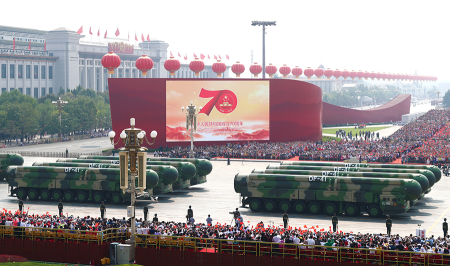China Silent on U.S. Risk Reduction Proposals
June 2024
By Xiaodon Liang and Shizuka Kuramitsu
China has not provided a “substantive response” to three U.S. strategic risk-reduction proposals and has declined to schedule a follow-on meeting to a November 2023 bilateral meeting on arms control and nonproliferation matters, U.S. officials said.

But diplomatic engagement continues on other tracks. Chinese and U.S. delegations met in Geneva on May 14 to begin a dialogue on strategic risks associated with artificial intelligence (AI). U.S. Defense Secretary Lloyd Austin spoke with his counterpart, Chinese Defense Minister Adm. Dong Jun, for the first time in 18 months on May 31 on the sidelines of the Shangri-La Dialogue in Singapore. U.S. officials confirmed that nuclear weapons concerns were on the agenda.
According to U.S. officials, the United States at the November meeting proposed risk reduction measures on missile launch notifications, a crisis hotline, and space deconfliction. China “has declined a follow-on meeting and has not provided a substantive response to the risk reduction suggestions we put forward,” Bonnie Jenkins, U.S. undersecretary of state for arms control and international security, testified May 15 before the Senate Foreign Relations Committee.
Jenkins said that the United States would continue to “increase diplomatic pressure” on China to be more transparent about its nuclear forces. Citing the Defense Department estimate that China will increase the number of its operational warheads from 500 warheads currently to 1,000 by 2030, she said the buildup raised questions about China’s nuclear posture and strategic goals.
The United States also has urged China and Russia to mirror the unilateral U.S. statement that humans, rather than AI, always should be in control of nuclear weapons. Speaking to reporters May 2, Paul Dean, principal deputy assistant secretary of state at the Bureau of Arms Control, Deterrence, and Stability, described that commitment as “an extremely important norm of responsible behavior.”
But when asked by reporters on May 13, a U.S. spokesperson declined to confirm that nuclear command and control would be prioritized during the talks with China in Geneva. According to a summary of the talks issued May 15 by the U.S. National Security Council, the two sides discussed “respective approaches to AI safety and risk management,” and the United States raised concerns about Chinese “misuse” of AI. The Associated Press on May 15 described hints of tension between the parties and said that the Chinese delegation criticized U.S. restrictions on exports of computer hardware that are critical to research in the AI field.
Meanwhile, China has continued to reaffirm its nuclear no-first-use policy. Arriving in France for a state visit May 5, Chinese President Xi Jinping, writing in the French newspaper Le Figaro, “stressed that nuclear weapons must not be used, and a nuclear war must not be fought.”
In response to questions from Sen. Chris Van Hollen (D-Md.), Jenkins said she was aware of a specific Chinese no-first-use proposal but the matter would have to be taken up by the interagency process. Jenkins added that she had questions about how China’s no-first-use policy was compatible with its current nuclear weapons buildup.
Jenkins also said that, in bilateral discussions with China, the United States stressed the importance of being a responsible nuclear power and how Russian threats of nuclear use are irresponsible.
Xi “has played an important role in de-escalating Russia’s irresponsible nuclear threats, and I am confident that [he] will continue to do so,” European Commission President Ursula von der Leyen said in a May 6 press statement, following talks with Xi and French President Emmanuel Macron.
On a May 16 state visit to China, Russian President Vladimir Putin agreed with Xi to deepen the “comprehensive strategic partnership of coordination for the new era” as they commemorated this year’s 75th anniversary of Chinese-Russian diplomatic relations, according to reports from the Chinese Foreign Ministry.
